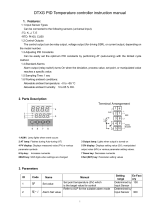
IMR03D05-E1
i-7
Page
4.1.15 When Event 2 type (ES2) and Event 2 assignment (EVA2) are changed
[Engineering mode: Function block No. 42] ................................................... 4-17
4.1.16 When Event 3 type (ES3) and Event 3 assignment (EVA3) are changed
[Engineering mode: Function block No. 43] ................................................... 4-17
4.1.17 When Event 4 type (ES4) and Event 4 assignment (EVA4) are changed
[Engineering mode: Function block No. 44] ................................................... 4-18
4.1.18 When CT1 type (CTt1) is changed
[Engineering mode: Function block No. 45] ................................................... 4-18
4.1.19 When CT2 type (CTt2) is changed
[Engineering mode: Function block No. 46] ................................................... 4-18
4.1.20 When Integral/Derivative time decimal point position (Id d P ) is changed
[Engineering mode: Function block No. 50] ................................................... 4-19
4.1.21 When Communication protocol (CMPS) is changed
[Engineering mode: Function block No. 60] ................................................... 4-19
4.1.22 When Register type (MP
....REG) is changed
[Engineering mode: Function block No. 62] ................................................... 4-19
4.1.23 When Soak time unit (STdP) is changed
[Engineering mode: Function block No. 70] ................................................... 4-20
4.1.24 When Initialization (DEF) is changed
[Engineering mode: Function block No. 91] ................................................... 4-20
4.2 Parameters to Be Automatically Converted ................................................ 4-21
Example of automatic conversion ..................................................................... 4-22
4.2.1 When Input data type (INDT) is changed
[Engineering mode: Function block No. 21] .................................................... 4-23
4.2.2 When Input 1_Decimal point position (1
.PGDP), Input 1_Input range high
(1
.PGSH) and Input 1_Input range low (1.PGSL) are changed
[Engineering mode: Function block No. 21] .................................................... 4-25
4.2.3 When Input 1_Control action (1. OS) is changed
[Engineering mode: Function block No. 51] .................................................... 4-27
4.2.4 When Input 1_Setting limiter high/low (1. SLH, 1. SLL) is changed
[Engineering mode: Function block No. 71] .................................................... 4-27
4.2.5 When Input 1_Output limiter high/low (heat-side) (1. OLH, 1. OLL)
is changed [Parameter setting mode: Parameter group No. 51] ..................... 4-27
4.2.6 When Input 1_Output limiter high/low (cool-side) (1
.oLHc, 1.oLLc)
is changed [Parameter setting mode: Parameter group No. 56] ..................... 4-27
4.2.7 When Input 2_Decimal point position (2
.PGDP) is changed
[Engineering mode: Function block No. 22] .................................................... 4-28
4.2.8 When Input 2_Input range high/low (2
.PGSH, 2.PGSL) is changed
[Engineering mode: Function block No. 22] .................................................... 4-30
4.2.9 When Input 2_Setting limiter high/low (2. SLH, 2. SLL) is changed
[Engineering mode: Function block No. 72] .................................................... 4-32
4.2.10 When Input 2_Output limiter high/low (2 . OLH, 2. OLL) is changed
[Parameter setting mode: Parameter group No. 52] ...................................... 4-32
4.2.11 When Memory area transfer (AREA) is changed
Memory area transfer mode] ......................................................................... 4-32






















